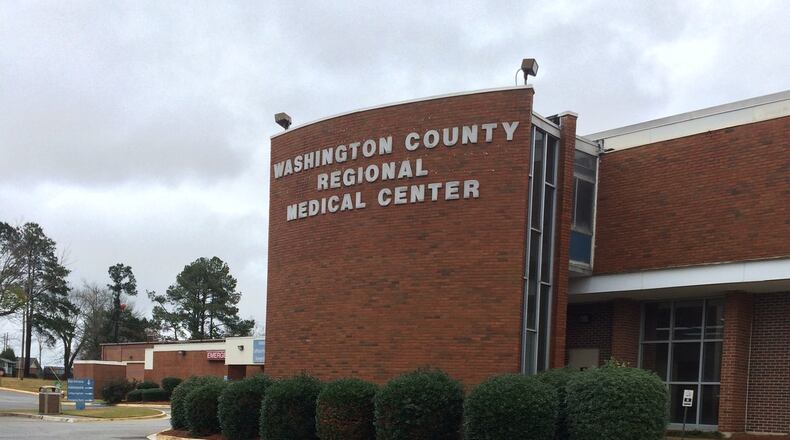RURAL HOSPITALS
Gov. Nathan Deal created the Rural Hospital Stabilization Committee in 2014 to find ways to stabilize the state’s rural health care system. Since 2013, six Georgia hospitals have closed, although one reopened with limited services. A hospital in Ellijay announced plans this week to close its inpatient operation and lease its ER to Piedmont Healthcare. At least 15 other Georgia hospitals are in bad financial shape, said Monty Veazey, president of the Georgia Alliance of Community Hospitals.“Nobody wants to close their hospital,” Veazey said. More than half of the state’s rural hospitals lost money in 2013, according to the Georgia Hospital Association.
The Atlanta Journal-Constitution explored Georgia’s rural hospital crisis in a series published last year.
A struggling hospital in this rural Georgia town embarked on a bold experiment a few years back, tapping the local Ford dealer to run its 54-bed facility. The bet was that his business savvy and ties with Duke University would save the hospital from financial ruin.
The experiment failed.
Eight years later, Washington County is once again facing the unsettling prospect that its hospital could close, and many in the community are second-guessing the motives and leadership of former CEO Jimmy Childre. It’s a classic example, some experts say, of the enormous challenges rural hospitals face these days, especially when local politics are part of the equation.
“Local politics and good hospital governance do not mix,” said James Orlikoff, a national expert on health care leadership.
An audit made public in December revealed that Childre earned consulting fees of $480,000 a year, paid directly to his car dealership. The hospital also paid more than $2 million to 21 employees and consultants linked to Duke who served as Childre’s brain trust for creating and implementing a turnaround strategy, the audit found.
Since Childre resigned a year ago, a promising management deal he put together with a big hospital in Augusta has fallen apart, and now, to right the hospital’s finances, the county’s voters must approve a tax increase.
It’s a hot topic, as the community contemplates the cost of keeping the hospital open and the cost in terms of lost access to health care, lost jobs and lost economic development opportunities if it closes.
“It’s the first or second or third thing everybody talks about,” said Chris Hutchings, the Washington County administrator. He said Childre’s compensation, which the audit characterized as excessive, has become one of the hottest topics.
“That’s one of the things that is kind of a burr under everybody’s saddle,” Hutchings said.
Although the issues currently confronting the citizens of Washington County are unusual in many respects, they speak generally to how rural hospitals struggle to survive. More than half of Georgia’s rural hospitals lost money in 2013, according to the Georgia Hospital Association. Some have closed already, prompting Gov. Nathan Deal to appoint a special committee in 2014 to find ways to stabilize other hospitals that are on the brink of failure.
Orlikoff said community leaders serving on public hospital authorities often underestimate the enormous complexity of operating even a small hospital in today’s enormously challenging health care environment.
“The notion that a businessman or businesswoman, no matter how accomplished outside of health care, can come in and effectively run a hospital is nonsense,” Orlikoff said. “I have seen it done, and in the vast majority of situations, it results in a failure.”
`I’m the scapegoat’
Childre grew up around his family’s car business and got his own Ford dealership when he was just 25. He built the business and earned a comfortable living in Sandersville, a small town between Augusta and Macon known for mining kaolin, a rare white clay used in paper and china manufacturing.
Residents of Washington County — population 20,000 — value having a local hospital. Getting to a large medical center requires more than a hour’s drive, and the closest small hospital is in Milledgeville, about 30 miles away.
Childre, 61, said he never planned to become a health care executive until he was asked in 1999 to become a volunteer member of the local hospital authority, an appointed public board that oversees the hospital and hires the CEO.
Coincidentally, at the same time, he was upping his game by enrolling in a Global Executive MBA program at Duke University’s prestigious Fuqua School of Business. In 2002, he became the authority’s chairman and later enrolled in programs at Duke and in England to study health care and nonprofits.
In a rare move, the authority in 2008 tapped Childre to take over the day-to-day operation of the hospital as its CEO.
During a four-hour interview Tuesday with The Atlanta Journal-Constitution, Childre expressed frustration that his leadership of the hospital has come under fire. He said he was praised while he was CEO for turning around the hospital’s finances with tough decisions and innovative leadership.
“If we had not done this, the hospital would have closed a long time ago,” he said.
Childre’s final step was negotiating a partnership agreement with University Hospital in Augusta that would keep the hospital open. But he said the county walked away from the partnership after he stepped down and then blamed him for the hospital’s continuing problems.
“I’m the scapegoat,” he said. “Except for the death of a family member, it’s the hardest thing I’ve ever been through in my life.”
Money trail
County officials said they asked for an audit of the hospital because they were under pressure to help the authority keep the doors open and had heard reports of mismanagement. What they received was a document summarizing a grim financial picture and raising serious questions about how Childre was paid.
Even though Childre worked full time running the hospital, he was paid as a contractor at a rate of $40,000 a month. The payments were made directly to Childre’s Ford dealership with no taxes deducted. The previous CEO got an annual salary that ranged from $124,850 to $162,414.
However, Childre said he had served many months as CEO without being paid. Factoring in those months, he said his compensation was actually $289,000 a year.
The audit also noted that the hospital leased office space in a building Childre owns and that its vehicles were repaired at his dealership.
His agreement to take over as hospital CEO stated that he would continue with a “corporate restructuring” that would include “Duke faculty, alumni and students” as consultants “on a pro bono and discounted fee basis.” The audit painted a different picture, though.
Childre hired 21 people “with a relationship with Duke University” as consultants or full-time employees at a cost of $2.2 million between 2008 and 2014.
“We do not have the expertise to evaluate the qualifications or the effectiveness of the services that these individuals provided,” the auditors wrote. “Additionally, we did not attempt to determine the cost to replace these individuals with others not affiliated with Duke University.”
Childre provided the AJC with a spreadsheet showing the funds went to 18 individuals or entities affiliated with Duke, including 11 former Fuqua students and two faculty members. In addition, he said, more than a dozen enrolled students performed research on hospital-related issues for free.
One of the ex-students listed on Childre’s spreadsheet received a total of $570,000 in salary for serving as the hospital’s chief operating officer during a six-year period, according to his LinkedIn profile. Another received $457,526 as the chief information officer, and yet another was paid $259,950 for serving as a “management executive,” according to their LinkedIn profiles.
An article about Childre posted on the Fuqua website in 2009 had the headline “Leader of Consequence: From Cars to Health Care” and noted how Duke faculty, staff, students and alumni had worked with him at the hospital.
Childre said the Duke experts proved to be great assets as he implemented progressive ideas that modernized the hospital’s technology and identified strategic changes to staffing and services.
Bad memories
But some who witnessed the changes firsthand said the work of Childre and his Duke cohorts led to diminished staff and resources and, ultimately, poor patient care.
James Solen, a registered nurse who worked at the hospital from 2008 to 2010, said the Duke consultants generated directives based on data and didn’t consider the realities of dealing with sick people.
“They would say, `We are averaging X number of patients a day, and this is what the staffing will be,’” he said. “It was very arbitrary. A very sick patient might demand all your time, but they didn’t take that into account.”
In separate interviews, Solen and another former nurse at the hospital, Wendy Bream, described how their jobs became more difficult as nurses were required to oversee nine to 12 patients at a time.
“There’s just no way at that volume you can properly take care of patients,” said Solen, who was fired after a confrontation with another employee over a patient being transferred from one department to another.
Solen and Bream also said equipment went unrepaired, causing further problems. “There’s nothing to show for all this — no new equipment, no shiny floor, no new technology,” Bream said, referring to the money spent during Childre’s tenure.
Bream said she was laid off and not offered another job when the hospital eliminated its labor and delivery unit in favor of adding day surgery in 2014. Then 9½ weeks pregnant, she said she had to move in with her parents in Alabama and deliver her child there.
“My co-workers, the doctor I trusted — I had to change everything,” she said. “I don’t want this to be a pity party about me, but, yes, I’m angry.”
In his interview with the AJC, Childre said he was simply reducing staff to standard hospital ratios. He added that every effort was made to keep people employed in new jobs when changes were made.
Even though he’s no longer involved with the hospital, Childre said he still spends a lot of time in meetings around the state, working on a way out of “the perfect storm” that is endangering hospitals everywhere.
If the Washington County hospital doesn’t make it, he said, “I’ll be devastated.”
About the Author
Keep Reading
The Latest
Featured



